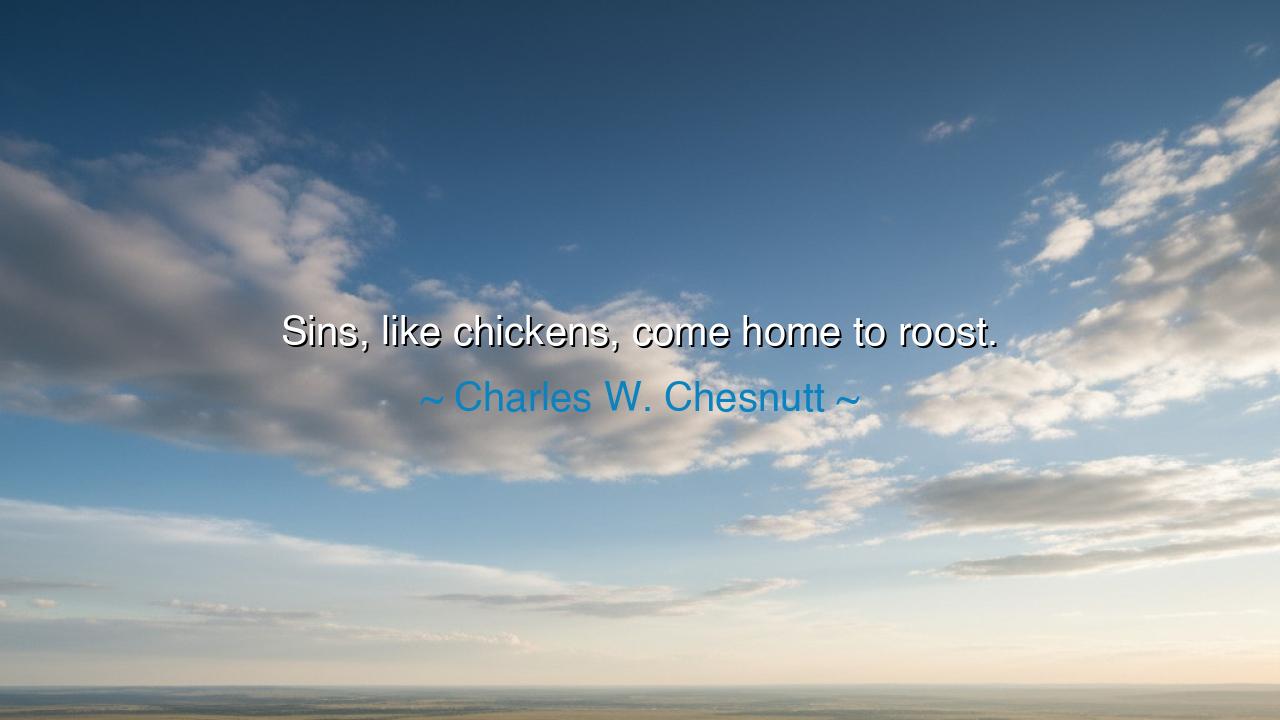
Sins, like chickens, come home to roost.






The author and moral visionary Charles W. Chesnutt once wrote, “Sins, like chickens, come home to roost.”
Though simple in its phrasing, this proverb carries the weight of eternal law — the truth that every action, whether good or evil, returns to its maker. Just as the farmer’s fowl, wandering through the fields by day, return to the roost by night, so too do the consequences of our deeds find their way back to the soul from which they sprang. Chesnutt, a man who looked deeply into the heart of human nature and the moral sickness of a divided society, used this timeless image to teach that no sin, no injustice, no cruelty can remain hidden forever. Sooner or later, the balance of life demands its reckoning.
The origin of this saying is older than Chesnutt himself — it has lived in many tongues and traditions, a seed of wisdom passed down through generations. Yet in Chesnutt’s use, it takes on a deeper meaning shaped by the moral landscape of his age. Living in post–Civil War America, a nation haunted by the ghosts of slavery and racial hatred, he saw clearly that the sins of one generation were being visited upon the next. The prejudice and violence that society sowed in the fields of its history were returning, generation after generation, to darken its future. Thus, when Chesnutt invoked this proverb, it was not only to warn the individual of moral decay, but to awaken the conscience of a nation.
The ancients knew this truth well. The Greeks called it Nemesis — the divine retribution that follows hubris, the arrogance of mortals who believe themselves above justice. The Hebrew prophets spoke of it as the harvest of sin: “Whatsoever a man soweth, that shall he also reap.” And in the East, the sages of India taught it through the law of karma, the unbreakable thread that ties every action to its consequence. Chesnutt stood among these wise voices, reminding his own people that moral order is not a superstition, but the heartbeat of the universe. No injustice fades into silence; it simply waits for its hour to return.
Consider the story of America’s own past, which Chesnutt knew all too well. For centuries, the nation had enslaved its brothers and sisters, tearing families apart, building wealth upon chains and blood. When emancipation came, the people hoped that freedom alone would heal the wounds — but the sins of slavery returned to roost in the form of hatred, segregation, and violence. The legacy of cruelty did not vanish with the passing of laws; it echoed through hearts and generations. In this way, the proverb revealed its bitter truth: no sin committed in the dark can escape the dawn of reckoning. Only repentance and justice can break that cycle.
Yet Chesnutt’s wisdom is not merely a warning; it is also a call to awareness. He does not speak only of punishment, but of balance — of the moral rhythm that governs life. Every action, however small, plants a seed in the soil of destiny. Acts of kindness return as blessings, and acts of cruelty return as suffering. Thus, the wise do not live in fear of retribution, but in reverence for consequence. They walk with care, knowing that their words and deeds ripple through time, touching lives unseen. To act rightly is to live in harmony with the order of the world; to sin is to disturb it, and in time, that disturbance will find its way home.
The ancients taught that the gods are patient, but their justice is sure. Chesnutt understood this not as superstition, but as truth revealed in human experience. The tyrant, the oppressor, the liar — they may flourish for a season, but their own deeds become their undoing. History itself testifies to this. Kingdoms built on cruelty crumble; power founded upon deceit devours itself. The seeds of evil, once sown, cannot bear good fruit. Therefore, the wise do not ask when the reckoning will come, for it always comes — quietly, steadily, in the fullness of time.
So, my child of the present age, take this teaching deeply into your heart: live with awareness, for nothing in life vanishes without trace. Every word you speak, every choice you make, every wrong you commit or kindness you offer — all will return to you. When you are tempted by anger or pride, remember that what you release into the world will one day knock upon your own door. Let your deeds be light, so that when they return, they may not darken your soul.
For as Charles W. Chesnutt reminds us, sins, like chickens, come home to roost — but so too do virtues. If you plant compassion, you will harvest peace. If you sow honesty, you will reap trust. And if you live with integrity, your life will return to you as a song of harmony, not a cry of regret. This is the ancient law, unbroken and eternal: that we are not judged by fate, but by the fruit of our own actions — and that the hands that sow the seed must one day gather the harvest.






AAdministratorAdministrator
Welcome, honored guests. Please leave a comment, we will respond soon